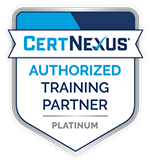title
Please take a moment to fill out this form. We will get back to you as soon as possible.
All fields marked with an asterisk (*) are mandatory.
Data Science for Business Professionals DSBIZ™ (Exam DSZ-210)
Course Description
Overview
The ability to identify and respond to changing trends is a hallmark of a successful business. Whether those trends are related to customers and sales or to regulatory and industry standards, businesses are wise to keep track of the variables that can affect the bottom line. In today's business landscape, data comes from numerous sources and in diverse forms. By leveraging data science concepts and technologies, businesses can mold that raw data into information that facilitates decisions to improve and expand the success of the business.Enrollment in this course includes courseware, plus credential, for DSBIZ (Exam DSZ-210).
Objectives
- Explain the fundamentals of data science.
- Identify functions of data science for business.
- Implement business requirements for data science.
Audience
Prerequisites
-
To ensure your success with this course, you should have basic knowledge of business processes, general business concepts, and relevant data that helps to solve business problems or achieve business goals. You should also have a basic understanding of information technology (IT) resources and systems, including networks, computers, and other digital devices used in an enterprise setting.
Topics
- Topic A: What Is Data Science?
- Data Science
- The Elements of Data Science
- Data Teams
- Required Skills and Knowledge
- Data Analytics
- Descriptive Analytics
- Types of Descriptive Analytics
- Diagnostic Analytics
- Types of Diagnostic Analytics
- Predictive Analytics
- Types of Predictive Analytics
- Prescriptive Analytics
- Types of Prescriptive Analytics
- Statistical Analysis Concepts
- Related Concepts and Technologies
- Pulling It All Together
- Discussing Data Science and Related Technologies
- Identifying Data Science Opportunities from a Dataset (Optional)
- Topic B: Types of Data
- Big Data
- Structured, Unstructured, and Semi-Structured Data
- Open and Proprietary Data
- Data Sources
- Data Repositories
- Discussing Types of Data Used in Data Science Projects
- Topic C: The Data Science Lifecycle
- Lifecycle Stages
- Problem Identification
- Data Collection
- Preprocessing
- Exploratory Data Analysis
- Modeling
- Model Deployment
- Communication of Results
- Discussing the Data Science Lifecycle
- Topic A: Improve Customer Experience
- Customer Experience
- Personalized CX
- Sentiment Analysis
- Recommender Systems
- Self-Service Support
- Chatbots and Virtual Assistants
- Improving Customer Experience
- Topic B: Improve Marketing Efforts
- Audience Segmentation
- Targeted Advertising
- Campaign Optimization
- Marketing Measurement Analysis
- Improving Marketing Efforts
- Topic C: Optimize Organizational and Transactional Security
- Fraud Detection
- Minimization of Loan Defaults
- Reduction of Intellectual Property Theft
- Risk Identification and Mitigation
- Cybersecurity Considerations
- Optimizing Organizational and Transactional Security
- Topic D: Enhance Operational Practices
- System or Component Failure
- Sales Forecasting
- Dynamic Pricing
- Customer Churn
- Talent Acquisition
- Transportation and Logistics
- Enhancing Operational Practices
- Topic A: Develop a Data-Centric Organization
- What Is a Data-Centric Organization?
- Challenges Associated with Building a Data-Centric Organization
- Organizational Preparation
- Team Preparation
- Discussing the Development of Data-Centric Organizations
- Topic B: Develop an Implementation Strategy
- Selection of Business Cases for Implementation
- Implementation Investments
- Data Collection Considerations
- Data Preparation Considerations
- Modeling and Deployment Considerations
- Results Communication Considerations
- Developing an Implementation Strategy
- Topic C: Identify Impact of Data Science on Business
- Effects on Overall Business Operations
- Effects on Business Processes and Practices
- Data Issues
- AI-Related Risks
- Discussing the Impact of Data Science on Business
- Topic D: Identify Governance Measures
- Ethical Considerations
- Legal and Regulatory Considerations, Frameworks, and Guidelines
- Discussing Governance Measures
Related Courses
-
Certified Data Science Practitionerâ„¢ (CDSP) (Exam DSP-210)
CNX0020- Duration: 5 Days
- Delivery Format: Classroom Training, Online Training
- Price: 3,475.00 USD
-
Certified Data Science Practitioner CDSP (DSP-210) Exam Voucher
LQEX-CNX0020V- Duration: 1 Day
- Delivery Format: Exam Vouchers
- Price: 0.00 USD
Self-Paced Training Info
Learn at your own pace with anytime, anywhere training
- Same in-demand topics as instructor-led public and private classes.
- Standalone learning or supplemental reinforcement.
- e-Learning content varies by course and technology.
- View the Self-Paced version of this outline and what is included in the SPVC course.
- Learn more about e-Learning
Course Added To Shopping Cart
bla
bla
bla
bla
bla
bla
Self-Paced Training Terms & Conditions
Exam Terms & Conditions
Sorry, there are no classes that meet your criteria.
Please contact us to schedule a class.

STOP! Before You Leave
Save 0% on this course!
Take advantage of our online-only offer & save 0% on any course !
Promo Code skip0 will be applied to your registration
Purchase Information
title
Please take a moment to fill out this form. We will get back to you as soon as possible.
All fields marked with an asterisk (*) are mandatory.










